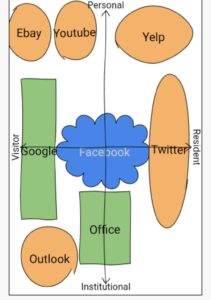My V&R mapping and my digital identity
My V&R map:

1. What digital platforms are students currently using to develop their professional network?
To develop professional network, students can use a wide variety of digital platforms, including Twitter, Microsoft team, Facebook, LinkedIn, Skype, Instagram and Pinterest.
2. What can you (as a student) consider to expand your professional learning network?
As far as I am concerned, there are mainly two aspects for a student like me to expand professional learning network. One is to participate. We can join online communities or Meetup groups to interact with and learn from others. We can proactively participate in discussions on social media platforms. Normally I just scan others’ opinions, but from now on I will try to interact with others and post my thoughts. The other is to create and share. Since everyone has different learning experiences and interests, we all have something useful that could share with others and help them. In this case, we should first identity what our strengths are, and then we can aggregate useful resources, provide related suggestions and our own sincere understanding. The sharing process is necessary and effective because when others find us helpful and resourceful they would be willing to follow us and become a part of our personal learning network.
There is one more idea that I think could help. Discuss with other students about their ways to expand professional learning networks. This is meaningful because there are always all kinds of tools or applications popping up. Our personal experience and attention is limited. Discussing with other would definitely help us to discover probably better ways.
3. In your network, how can you create a digital identity/reputation?
A good digital reputation plays a more important role in our life. It could be regarded as our personal brand. Some employers may check online the information of the potential employee as a pre-interview. So how to create a good reputation?
To create a digital reputation, the fundamental rule, in my opinion, is to follow good web netiquette. Avoid posting something offensive or impolite. Some tend to view internet as a space void of rules and unleash their negative energy accumulated from reality. But there are real people, and people do get hurt by anonymous comments. Avoid boasting about success online. Nowadays, some use social media platforms not to share real life experiences or feelings but just to brag about themselves. This could be annoying to the audience.
From another perspective, we can promote our personal brand by creating high-quality content and engaging with others actively. We need to provide something valuable and interesting. We should try to be honest and accurate so that people would think we are reliable and professional, and that helps our digital reputation.
4. Consider what a local employer would do if you applied for a job with them – can they search the content, is it of benefit to the career path, does it hinder the opportunity of employment?
I think it is beneficial to my career path. I pay attention to my netiquette, avoiding offensive posts or comments. I hardly debate with people who hold against my contents. I involve myself into friendly and thoughtful conversations and discussions online.
My posts mainly focus on sharing of some songs, some articles with thought-provoking or innovative ideas, and comments on certain news. I think these contents help to show others that I am someone who embraces new ideas and cares about society and other people.
References
- Webroot.com. n.d. What Is Netiquette? A Guide To Online. [online] Available at: <https://www.webroot.com/us/en/resources/tips-articles/netiquette-and-online-ethics-what-are-they#:~:text=Netiquette%20is%20a%20combination%20of,in%20an%20online%20social%20environment.> [Accessed 29 September 2020].
- Edutopia. 2019. Leveraging Social Media To Build A Digital PLN. [online] Available at: <https://www.edutopia.org/article/leveraging-social-media-build-digital-pln> [Accessed 29 September 2020].
- Common Sense Education. n.d. Social Networks For Students And Teachers | Common Sense Education. [online] Available at: <https://www.commonsense.org/education/top-picks/social-networks-for-students-and-teachers> [Accessed 29 September 2020].
Recent Comments